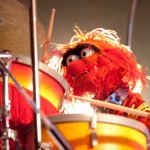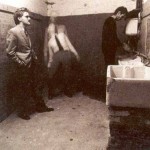10 Essential UK Post-Punk Albums
A lot of the genre primers we compile coincide with a notable anniversary — an album, a single, or perhaps even a birthday if we feel like lighting all those candles. But it’s hard to single out one particular release to commemorate when so many ground-breaking releases hit shelves in such a short span of time. Post-punk’s golden years began around 1978, but it really hit its stride in 1979 — 35 years ago — with one solid platter of jittery guitar scratch and jerky rhythms after another coming through the pike, sometimes with a twinge of gothic darkness, and sometimes with radical leftist politics to propel their radical anthems. Of course, the sound of post-punk differed dramatically depending on which side of the Atlantic the band in question hailed from. To help the distinction, we’re separating them into two lists; we’ll get to the American versions soon enough, but for now, queue up the dark dancefloor anthems on our 10 essential UK post punk albums list.
 Magazine – Real Life
Magazine – Real Life
(1978; Virgin)
Howard Devoto originally held the position of being the leader of The Buzzcocks, but he left the group before they even released their debut album, forming his own band Magazine in the process. And though Devoto and Buzzcocks frontman Pete Shelley have similar voices to a degree, the parallels between the two bands don’t go much deeper than that. Magazine, for one, was a much darker and more sinister band, working their way up to some truly chilling material on 1979’s Secondhand Daylight. But song for song, Real Life is their strongest effort, from the funky surge of “Definitive Gaze” on up to the blazing riffs of “Shot by Both Sides” and the gothic stomp of “The Light Pours Out of Me.” Just about every corner of this record oozes menace, or emanates noxious fumes. It’s an unsafe place, which in turn makes it a thrilling one, and most dangerously of all, a catchy one. I suppose that’s one more thing that Magazine and The Buzzcocks have in common. – JT
 Wire – Chairs Missing
Wire – Chairs Missing
(1978; Harvest)
Wire’s signing with Harvest Records — a label known during most of the ’70s for being an outpost of progressive rock — didn’t put an end to the punk v. prog debate of the ages, though it might have made people rethink that either had to be mutually exclusive. Wire, for their part, were certainly the most progressive of the ’70s UK punk class, primarily because they graduated so quickly from punk to post-punk to an even weirder and more abstract version of it on 154. Chairs Missing is where the solution is at its most potent. Still punk in spirit on high-speed janglers like “Men 2nd,” “Too Late” and “Sand in My Joints,” the economic punks of 1977’s Pink Flag grow considerably darker and more abstract, concocting a slow-moving nightmare on opening track “Practice Makes Perfect,” offering a hypnotic lullaby with “Used To,” and having some sing-along fun with “I Am the Fly.” Given just how far and wide the sounds range on Chairs Missing, it’s remarkably cohesive. The consensus may have already been decided, but here’s a contrary opinion: This is their best album. – JT
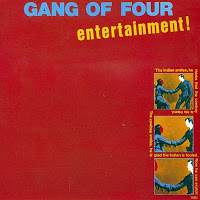 Gang of Four – Entertainment!
Gang of Four – Entertainment!
(1979; EMI/Warner Bros.)
In this writer’s opinion, Entertainment! is the stage on which the eccentric genre-bending of post-punk was first matched with the quirky pop songwriting that would become synonymous with the genre in its later years. Equal parts danceable rock and abrasive experimentation, Gang of Four’s debut melded elements of funk, dub and reggae under a punk-rock aesthetic, often landing in a groove not too far off from their American contemporaries The Talking Heads. But it’s on a song like “Damaged Goods” where Gang of Four’s unique flavor stands out on it’s own; its grooving, sarcastic and uncompromising commentary on sexual mindsets is unashamedly pointed and damn fun at the same time. Throw in “Natural’s Not In It,” “Contract,” and a slew of other A-list hits and you have yourself a winning record. – ATB
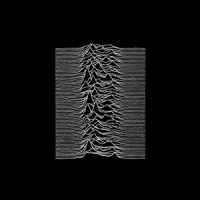 Joy Division – Unknown Pleasures
Joy Division – Unknown Pleasures
(1979; Factory)
This list more or less couldn’t exist without this album being here, given that history has proven time and time again that ripping off Joy Division is pretty much always in style. Hell, it’s been 12 years and Interpol are still milking this aesthetic for all its worth. There’s a good reason for it, though — Joy Division wrote some incredible songs, and 10 of the best of them form their debut album Unknown Pleasures. Dark and moody before “goth” became a buzzword, Unknown Pleasures takes a trip through some harrowing places without forgetting to load up these shadowy hellscapes with hooks and rhythms you can really writhe to. In fact, it goes to some pretty disturbing places (see closer “I Remember Nothing”), so it’s a good thing there are fast-moving highlights like “Disorder” and “She’s Lost Control” to balance them out. And that’s in part why the album endures — misery loves company, but it prefers catharsis. – JT
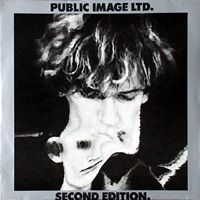 Public Image Limited – Second Edition
Public Image Limited – Second Edition
(1979; Virgin)
It’s no surprise that two of the foremost legends in British punk went on to help define the attitude and aesthetic of the post-punk movement. I’m speaking, of course, about John Lydon (ex-Sex Pistols) and Keith Levene (ex-The Clash). Taking the bombast and edge of their earlier work and broadening the range of emotions and influences contained within, PiL wound up with a product that was more entrancing, more visceral and more culturally alienating than the sum of its parts. While PiL put out an outstanding catalog of work in their hey-day, Metal Box — now commonly known as Second Edition — is the gem of their discography. The core group of Lydon, Levene and Jah Wobble’s hypnotic, dub-influenced bass work was anchored by a rotating cast of drummers, making for some of the best experimental rock jams recorded. The album has a loose, improvised tone — a risky choice, but one with high rewards when you consider the organic spunk of “Careering,” the tortured swirl of “Memories” or the meandering cynicism of “The Suit.” And, on Second Edition, Lydon truly stepped into his new vocal role. Whereas he was mostly concerned with anti-social trends and anti-government notions while working with the Sex Pistols, Lydon’s vocals here are much more multi-dimensional — equally concerned with his own emotions and personal struggles as he is keen to make social observations. On Second Edition, this group of well-established punks showed that they could usher in new sounds with the best of them. – ATB
 The Cure – Seventeen Seconds
The Cure – Seventeen Seconds
(1980; Fiction)
Travel back to 1980 and you’ll be transported to a time before Robert Smith discovered hairspray and eyeliner. It was a different time; for starters, The Cure had different members and were a year into what would become a highly prolific period that saw the release of one new album or EP every year until 1985. And each one stood out for having a unique character — Faith was muted and melancholy, while Pornography was bleak and terrifying. Seventeen Seconds, the band’s second album, was still plenty dark, but retained much of the punk edge that characterized their debut, 1979’s Three Imaginary Boys. With this album, Smith & Co. start to explore how much deeper they can descend into the forest that lie on the path ahead. Admittedly, one or two tracks feel like exercises without an endgame (see: “Three”), but what’s remarkable is how quickly they went from moody twenty-year-olds to dark and thoughtful twenty-one-year-olds, whether churning out a harrowing dirge like “At Night,” or crafting their first goth-rock masterpiece, “A Forest.” – JT
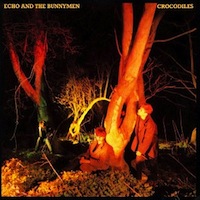 Echo & the Bunnymen – Crocodiles
Echo & the Bunnymen – Crocodiles
(1980; Korova/Sire)
In many ways, Echo and the Bunnymen picked up where Joy Division had left off after Ian Curtis’ unfortunate passing. Both bands formed their grooves around driving bass lines, but not the funk or dub lines that inspired many of their contemporaries. Both projected an aura of mysticism uncommon for rock at the time. Ian McColloch’s vocals were even eerily similar to Curtis’, his dark baritone reciting morbid tales of horror and sorrow. But, despite these striking similarities, the band’s debut, Crocodiles, remains a unique landmark of its own, boasting powerful tracks like “Pride” and “Rescue.” What set Echo and the Bunnymen apart was their unique ability to combine morbid, angular rock with a more pop-oriented flare, a la Bowie or Queen. Crocodiles is equally suited for play on the stadium stage or in a graveyard. It’s that flexibility that makes it such a solid and timeless record. – ATB
 Siouxsie and the Banshees – Kaleidoscope
Siouxsie and the Banshees – Kaleidoscope
(1980; Polydor)
In a list stacked fairly heavily with debut records, we went instead with Siouxsie and the Banshees’ third LP. Like another notable group on this list, the Banshees banded together after being inspired by the aura and attitude at a Sex Pistols show. However, this group took a little longer to get their feet on the ground and achieve the sound they were meant to boast. On Kaleidoscope, founding members Siouxsie Sioux and Steven Severin were joined by ex-Magazine guitarist John McGeoch and drummer/percussionist Budgie (formerly of The Slits), and redirected their sound down the dark-yet-glimmering, gothic path that would define the band’s career. Their seamless combination of post-punk sentiment and electronic elements was further enhanced by McGeoch’s innovative guitar work. Inspiring acts as storied as The Cure, The Smiths and The Jam, Kaleidoscope is still highly regarded for its artistic innovation, as well as its early contributions to the goth rock genre. – ATB
 The Psychedelic Furs – Talk Talk Talk
The Psychedelic Furs – Talk Talk Talk
(1981; CBS)
The fraternal duo of Richard (vocals) and Tim Butler (bass) brought a sense of whimsy to post-punk that didn’t quite exist beforehand. Between The Psychedelic Furs and their later project Love Spit Love, they penned countless songs that infused post-punk with glam-rock sensibility, pop-friendly sing-along appeal and — of course — psychedelia. On Talk Talk Talk, they were straddling the best of both worlds, writing gritty, yet beautifully embellished jams like “Pretty in Pink,” “Dumb Waiters” and “All Of This And Nothing.” On the flip side, the record has its fair share of more uncompromising rockers like “Mr. Jones” and “So Run Down” as well. Looking back, Talk Talk Talk represented the delicate bridge between post-punk and its more pop-thirsty cousin new wave; equally experimental, but with a growing penchant towards ear-pleasing arrangements and wider commercial appeal. – ATB
 This Heat – Deceit
This Heat – Deceit
(1981; Rough Trade)
This Heat are easily the most peculiar band on this list, and that’s saying a fair amount when you consider just how weird many of the bands of the post-punk era were. This Heat, however, essentially played nothing straight. More prog than Wire, darker than Joy Division, and more experimental than Public Image Limited, This Heat strode the line between dadaism and nihilism, marrying noisy tape experiments with honest-to-god songs, and the occasional melody you could sing along to without having to concentrate too hard. Deceit is their true work of genius — an album that pairs abrasion with intricate instrumentation, and innovation that few other bands have attempted. There are true moments of accessibility, like the opening lullaby (if you can call it that) “Sleep,” or the hard-driving “S.P.Q.R.” But then again there’s the hallucinogenic carnival ride of “Triumph,” the dirge-like recitation of the Declaration of Independence in “Independence,” and the symphony of thumping and radio frequencies in “Radio Prague” that will almost certainly lead to some unsettling dreams. There are moments during Deceit where it might not be entirely clear what the hell is going on, but it’s all worth hearing and, in its greatest moments, unlike anything else. – JT
You might also like:
